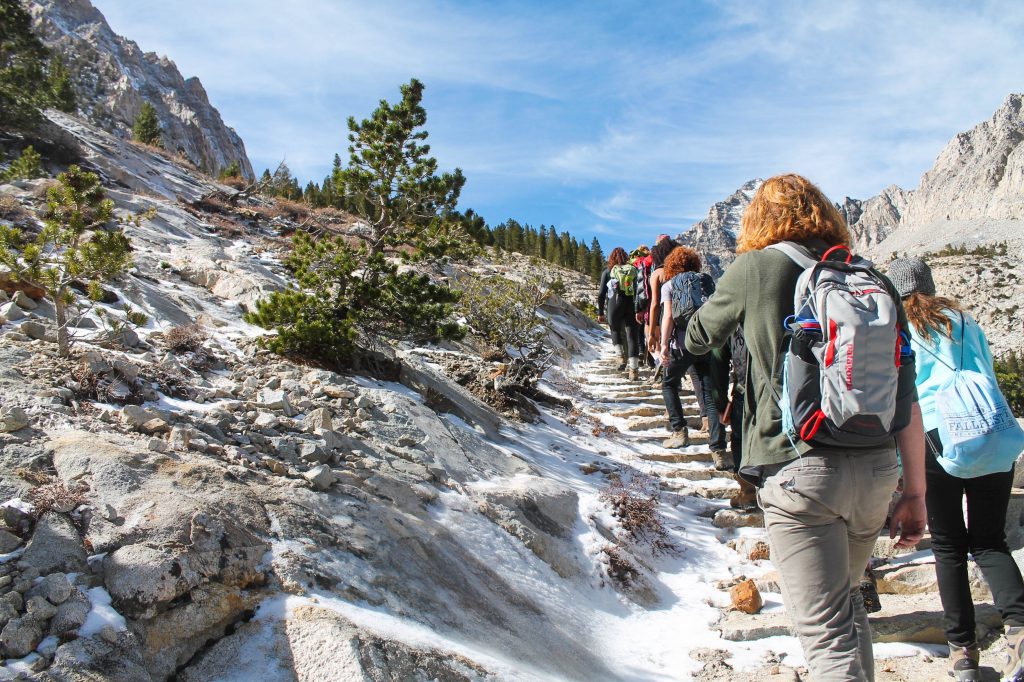
The University’s Quality Enhancement Plan will create more research-intensive science courses like the field geology class that sends students to California to examine geologic and environmental changes. (photo by Jack Davidson)
A five-year, campus-wide learning initiative launched this spring aims to transform UNC’s undergraduate science experience — with more opportunities for hands-on research and collaboration and experiences to help students hone their analytical and problem-solving skills to tackle real-world problems.
The Quality Enhancement Plan (QEP), “Creating Scientists: Learning by Connecting, Doing and Making,” is composed of four programs that focus on experiential learning for undergraduate students:
- Integrated Curricula: An interdisciplinary effort to integrate the arts and humanities with science courses to provide critical thinking skills and an understanding of the myriad ways in which science and culture are entertwined.
- Course-based Undergraduate Research Experience (CURE): An introduction to research by engaging a class in a hypothesis-driven research problem.
- Makerspace: The design and making of physical objects as a way to learn research and entrepreneurship.
- Research Exposure Opportunities: Infrastructure to ensure research experiences for all students.
“The process of science is non-linear, non-prescriptive and sometimes messy,” said QEP Director Kelly Hogan, assistant dean of instructional innovation in the College of Arts & Sciences and an associate STEM teaching professor of biology. “QEP will implement educational innovations that align more closely with contemporary models of teaching and learning science — the interconnections between how novel ideas arise, how ideas are rigorously tested, the feedback from the scientific community, and the needs and benefits of society.”
The QEP is a required part of the University’s reaccreditation process by the Southern Association of Colleges and Schools Commission on Colleges (SACSCOC). Every university undergoing this 10-year review is required to create a QEP that focuses on broad-based campus initiatives to improve student learning. (Carolina’s last QEP, in 2006, revamped the General Education curriculum and introduced Maymester, for example.)
Planners chose to focus the latest QEP on undergraduate science for many reasons. There has been a 60 percent increase in intended or declared science majors since 2004. Many alumni and graduating seniors report weaknesses in quantitative skills. Women, minorities and first-generation students remain underrepresented in the sciences at UNC, and transfer students face particular obstacles in completing science coursework in time to graduate in four years.
The QEP “is a chance to get a lot of smart people from across campus thinking about how we can take a university that already leads in undergraduate education and make it better — transform it — in the next decade and beyond,” said Greg Copenhaver, biology professor and director of graduate studies.
Copenhaver co-chaired, with Adam Persky, a 24-member QEP Implementation Committee to lead the QEP prior to Hogan being appointed QEP director. Persky is clinical associate professor at the Eshelman School of Pharmacy.
“I see this as a starting point for transforming undergraduate education in ways that prepare students for careers that aren’t even out there yet and help them develop lifelong learning skills, regardless of what they choose to do,” Persky said.
To learn more, visit qep.unc.edu. Follow QEP on Facebook.
Watch a message from Chancellor Carol Folt about the QEP.
Watch faculty members talk about their research during the first University Research Week.
Read a story about CURE courses.
By Cyndy Falgout
